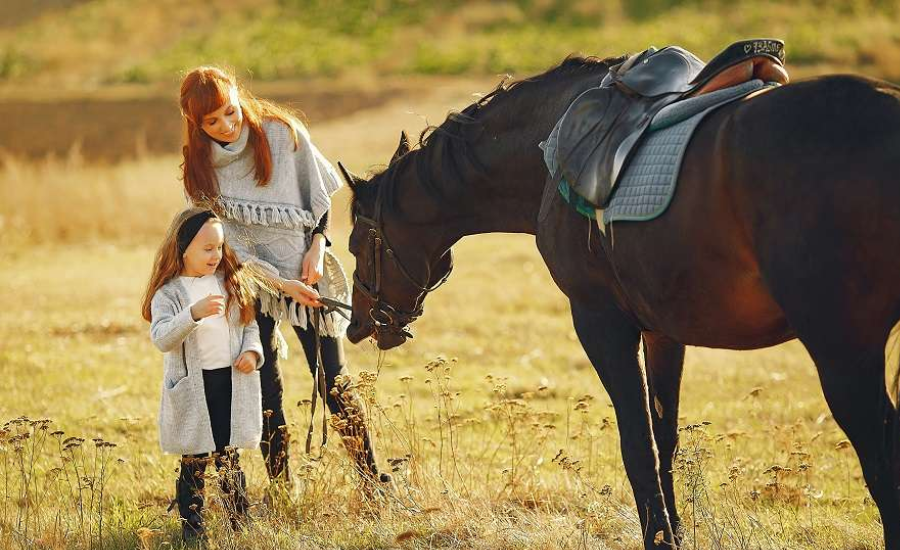When we think about therapy, our minds often jump to talking with a counselor in an office setting. But healing doesn’t always happen in such traditional spaces. One of the most unique and effective forms of therapy is something many people are still learning about—horse therapy. Also known as equine-assisted therapy, this innovative approach to mental health harnesses the power of the human-horse connection to promote emotional well-being and healing. Whether you’re struggling with trauma, anxiety, depression, or other emotional challenges, horse therapy offers a different kind of path to recovery.
What is Horse Therapy?
At its core, horse therapy is a form of experiential therapy where people work closely with horses as part of their mental health treatment. Unlike conventional talk therapy, horse therapy encourages individuals to engage in hands-on activities with horses, such as grooming, leading, feeding, or simply spending time observing these majestic creatures. These interactions are overseen by a trained therapist, who helps guide the process to ensure therapeutic growth and reflection.
One of the reasons horse therapy is so effective is that horses are incredibly perceptive animals. They pick up on subtle cues in body language and energy, mirroring the emotions of those around them. Because of this, horses serve as excellent partners in helping individuals identify and work through their feelings in real time.
Why Horses? Understanding the Human-Horse Connection
You might wonder—why horses? Why not dogs, cats, or other animals often used in therapy settings? While all animals have therapeutic potential, horses are unique in their size, sensitivity, and nature as prey animals.
Horses are large and powerful, which can make them intimidating at first. However, building trust with a horse can give individuals a strong sense of accomplishment. This trust-building process is key to emotional healing, especially for people who struggle with relationships, boundaries, or self-worth.
Horses are also incredibly responsive to human emotions. They don’t judge; instead, they reflect the emotional state of the person interacting with them. For instance, if someone is anxious or stressed, the horse may become restless or distant, mirroring the person’s emotional state. Conversely, when someone is calm and focused, the horse often becomes relaxed and attentive. This non-verbal feedback helps individuals become more self-aware, offering a tangible way to see the impact of their emotions.
How Horse Therapy Aids Emotional Healing
Enhances Emotional Awareness and Regulation
One of the first ways horse therapy aids emotional healing is by helping individuals become more aware of their emotions. Horses are highly intuitive and react to a person’s emotional state, giving immediate feedback without words. When a person is anxious, stressed, or upset, the horse may react by becoming skittish or aloof. This reaction allows the individual to recognize their emotional state and adjust accordingly.
As individuals learn to regulate their emotions to better connect with the horse, they develop better emotional control. These skills are transferable to everyday life, where managing emotions is key to maintaining healthy relationships and mental well-being.
Fosters Trust and Connection
For many people who have experienced trauma or struggle with anxiety, forming trusting relationships can be difficult. Horses, being non-judgmental and honest, offer a safe space for individuals to learn about trust. The relationship built with the horse during therapy can mirror the process of building human relationships, where trust is earned through consistency, patience, and communication.
Because horses respond to calm, assertive energy, individuals in horse therapy learn how to present themselves confidently and communicate effectively without words. These interactions can help restore a sense of control and trust that may have been damaged by previous life experiences.
Promotes Mindfulness and Presence
One of the key components of emotional healing is learning to live in the present moment, rather than dwelling on the past or worrying about the future. Horses, by their very nature, live in the moment. They aren’t concerned about what happened yesterday or what might happen tomorrow. Instead, they focus on the here and now, responding to the present situation.
When individuals engage in horse therapy, they are encouraged to stay mindful and present. Whether they are grooming the horse, leading it, or simply observing its behavior, they must focus on the task at hand. This practice of mindfulness can help reduce symptoms of anxiety, depression, and stress, allowing individuals to feel more grounded and connected.
Builds Self-Esteem and Confidence
Successfully interacting with a horse, particularly when overcoming fear or doubt, can lead to a tremendous boost in self-esteem. Horses are large animals, and caring for or leading one requires focus, patience, and gentle assertiveness. Each positive interaction with the horse reinforces the individual’s ability to manage challenging situations and fosters a sense of accomplishment.
For people dealing with low self-worth or a lack of confidence, these small victories can translate into greater confidence in other areas of life. Whether it’s managing anxiety, overcoming past trauma, or improving relationships, the skills and emotional resilience gained in horse therapy can have far-reaching effects.
Facilitates Non-Verbal Communication
For individuals who struggle with verbalizing their feelings or for those who have been through trauma, talking about emotions can be overwhelming. Horse therapy allows people to express themselves and work through their emotions without relying on words. Horses respond to body language, energy, and emotions, making it easier for individuals to explore their feelings in a non-verbal, yet highly interactive way.
The non-verbal communication skills practiced during horse therapy can also help individuals who struggle with social interactions, such as those with autism or social anxiety. Through these silent exchanges, people can learn how to better understand themselves and others.
Who Can Benefit from Horse Therapy?
The beauty of horse therapy is its versatility. It’s an excellent form of therapy for individuals with a variety of emotional, cognitive, and behavioral challenges. Some common conditions where horse therapy has proven to be particularly effective include:
Post-Traumatic Stress Disorder (PTSD): Many trauma survivors, including veterans, have found relief through horse therapy, where they can work through trust issues and emotional regulation.
Anxiety and Depression: The calming presence of horses and the mindfulness aspect of horse therapy can significantly reduce anxiety and depressive symptoms.
Autism Spectrum Disorder: The non-verbal communication required in horse therapy helps individuals with autism practice social skills and improve sensory processing.
Substance Abuse Recovery: Many addiction recovery programs have successfully incorporated horse therapy, as it promotes self-awareness, accountability, and emotional healing.
Incorporating Horse Therapy into a Mental Health Plan
While horse therapy offers many emotional benefits, it’s typically used as a complementary form of treatment. It works well when integrated into a broader mental health plan that may include talk therapy, medication, or other therapeutic practices. The experiential nature of horse therapy provides individuals with a different outlet to process emotions, while traditional therapies can further support their mental health journey.
Conclusion
Horse therapy offers a unique and powerful way to aid emotional healing. Whether you’re struggling with anxiety, depression, trauma, or other emotional challenges, working with horses can help you reconnect with yourself and the world around you. Through mindfulness, trust-building, and emotional regulation, horse therapy can open doors to healing that traditional therapy alone may not provide.
If you’re curious about how horse therapy might help in your mental health journey, it could be worth exploring this innovative approach. By fostering trust, promoting mindfulness, and building self-esteem, horse therapy offers a gentle yet effective path to emotional well-being.
FAQs About Horse Therapy
What is horse therapy?
Horse therapy, also known as equine-assisted therapy, involves therapeutic sessions where individuals interact with horses under the guidance of a licensed therapist. The therapy helps with emotional regulation, self-awareness, and relationship-building.
Do I need to know how to ride a horse to participate in horse therapy?
No, you don’t need to know how to ride a horse. Most horse therapy sessions focus on ground activities such as grooming, feeding, or simply leading the horse. Riding may be included, but it is not required.
How long does a horse therapy session last?
A typical horse therapy session lasts between 60 and 90 minutes, depending on the individual’s needs and the treatment plan.
Can horse therapy help with anxiety?
Yes, horse therapy can be very effective for individuals with anxiety. The calming presence of horses, combined with the focus on mindfulness, helps reduce stress and anxious thoughts.
Is horse therapy suitable for children?
Absolutely! Horse therapy is beneficial for individuals of all ages, including children. It is especially helpful for children who have difficulty expressing their emotions or those dealing with trauma, anxiety, or developmental challenges.
Stay In Touch For More Updates And Alerts: Forbes Zine




